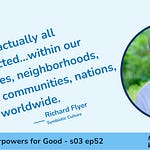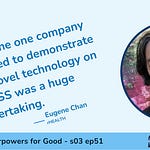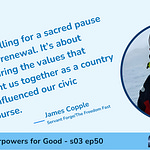Remember, you can watch the Superpowers for Good show on e360tv. To watch the episode, download the #e360tv channel app to your streaming device–Roku, AppleTV or AmazonFireTV–or your mobile device. You can even watch it on the web.
Devin: What is your superpower?
Mayo: I would say speaking and speaking with authority and power is really my superpower.
Alphonso Mayo founded Mentoring Mentors in 2014 “with one mission and one mission only, and that was to inspire young people to become the best version of themselves,” he says.
Mayo, as he is known to all, says, “Growing up in Baltimore is no easy feat, especially when you grow up in poverty.” He was raised by his paternal grandparents, noting that the household included 16 people.
Knowing only the community defined by the blocks of his neighborhood, he lacked exposure to the broader world and the opportunities beyond the narrow borders that defined his life.
He arrived in high school with a learning disability, reading on a first-grade level and struggling more with math.
“I had big goals, and I had no idea how I was going to achieve them,” Mayo says. “I just knew I didn't want to be like the community I came from. I didn't want to be like my family. I didn't want to be like my father.”
“In high school, I realized this goal to become an NFL player wouldn't be realized unless I graduated from high school, attended a decent university, and was able to perform,” he says.
“I wound up entering this center called the Ambrose Outreach Community Center, and I was offered a job to be a tutor. Now, mind you, I couldn't read. I was pretty much failing everything,” Mayo recalls.
The opportunity to teach first and second-graders how to read allowed him to learn to read. “I wound up becoming in the top 10 percent of my class and the first person in my family to go off to college.”
“Everything that I do is informed from my upbringing,” he says, noting that in 2015, he changed the direction of Mentoring Mentors to focus on helping high school students become mentors to junior high school students. He calls the program “near-to-peer mentoring.”
The profound insight recognizes that the younger kids respond to mentors near their age better than they do to adults, while at the same time, the older students learn to flex leadership muscles they didn’t know they had. Older and younger students alike gain tremendous benefits.
The program is relatively small today, but that is by design, Mayo says:
I think about all of the friends I've lost, all of the teammates that I played with who were far more talented than me. I just know if we want to change that, it has to be deep-rooted work. And so our work is really, really deep. It's not wide, but it's deep.
Throughout this work that now spans a decade, Mayo has been using a superpower he discovered in high school: he can use his voice to change the world. He can speak!
Mayo will speak at SuperCrowdBaltimore on March 21st at the B&O Rail Museum. Register now using the discount code SUPERCROWD to save 30 percent.
AI Episode Summary
1. Alphonso Mayo, also known as "Mayo," is the CEO and founder of Mentoring Mentors, a nonprofit in Maryland that focuses on inspiring young people to become the best versions of themselves.
2. Mentoring Mentors initially served high school athletes but later shifted to a near-to-peer mentorship model where young people are trained to mentor even younger individuals.
3. The organization's current mission is to develop the next generation of community leaders with a focus on exposure, personal/social/emotional development, and leadership development.
4. Mayo's own challenging upbringing in Baltimore, characterized by poverty, a lack of exposure, and familial struggles, deeply influences the work he does with youth today.
5. After overcoming his own obstacles, including learning to read while mentoring first and second-graders, Mayo became the first in his family to attend college, showing the power of mentorship and perseverance.
6. Mayo believes in creating a family-like atmosphere for young people, offering consistent and lifetime mentorship to help them navigate life's challenges and inspire them to achieve more.
7. As a former athlete, Mayo discovered his speaking abilities unexpectedly during a football game, realizing he could influence and inspire his teammates effectively.
8. Mayo advises that to use our voices effectively and reach our potential, we should write our plans down, not be afraid to fail, eliminate distractions, and be okay with incremental improvements (the 1 percent rule).
9. To support Mentoring Mentors, Mayo invites viewers to visit the website at www.mentoring-mentors.org to donate and become monthly supporters.
10. Mayo can be reached on social media platforms by typing in his name. His personal Instagram handle is @20mayo_mayo, and he invites people to directly email him at AlphonsoMayo@mentoring-mentors.org for strategic support and collaboration.
How to Develop Speaking As a Superpower
Mayo shared the story of how he discovered his superpower:
It was 2005 when I identified my superpower. Because I've always been an athlete, I've always been very outspoken. But I was a quiet leader. I just let my play speak for itself.
There was one particular game in Baltimore we were playing a powerhouse school, Dunbar Poets. Man, they've been winning championships since I can remember; my school wasn't the best. I intentionally went to Northwestern to improve the culture of athleticism because that's what I was taught from my coach.
Man, they were beating on us so bad. I had never spoken. I wasn't considered a team captain or anything. Then, at halftime, our coach came down and he pretty much just threw in the towel and just talked about how bad we were performing and how we didn't deserve it.
Parents were concerned about their athletes’ health because we were getting hit pretty brutal. I just took my helmet off, and I just spoke up. I'll never forget I said something along the lines of, “Somebody call my grandmother.” They didn't know what I was talking about. I told them that because I would much rather die.
Showing them that I'm going to do everything in my power for them to not score again; I refused to quit. Any person out there that wanted to be a part of that, “Stand with me!”
I was crying and things like that. But I think the fact that I said something like that inspired my teammates. Dunbar didn't score another point. We lost the game. But that was at that moment that I realized that my voice had power. So I would say speaking and speaking with authority and power is really my superpower.
The story illustrates how the spoken word influences action and changes outcomes. It has power.
Mayo offers some tips for developing your speaking.
“When I walk into every classroom, the first thing I tell them is, you're a leader. You just don't know it yet. You just haven't discovered discovered it yet. I'm here to help you do that,” he says.
When you want something, make it a goal. “ when you hear something that's in your heart that you want to do, you write it down.”
“You don't have to know it all in order to achieve it all,” he says. “I think sometimes we psych ourselves out of our promise.” Just take it one step at a time.
He suggests striving to follow the “1 percent rule,” getting 1 percent better every day, allowing you to make 365 percent improvement in a year.
Finally, he suggests learning from people on parallel paths rather than resenting them. He says:
I champion them, you know, and then even more importantly, I try to connect with them because every good coach has a coach, every good mentor has a mentor, every great pastor has a pastor, every great therapist has a therapist, every great doctor sees a doctor. So, who are we not to do the same?
By following his example and advice, you can make speaking with power and authority a skill you can use. With practice, it can become a superpower that enables you to do more good in the world.
Remember, however, that research into success suggests that building on your own superpowers is more important than creating new ones or overcoming weaknesses. You do you!
Guest Profile
Alphonso Mayo:
Founder and CEO, MENTORING MENTORS INC
About MENTORING MENTORS INC: Mentoring Mentors Inc. (MMI), established in 2014, is a non-profit committed to youth development. Our transformative journey began with six high school students and has since evolved into an after-school and school-based outreach program. Pioneering the Intergenerational Near-to-Peer Mentoring Model in 2018, MMI focuses on personal, social, and emotional development during middle school, emphasizing academic improvement, team building, and community service. For high school youth, our approach shifts to leadership development, which provides opportunities to pair them with middle school youth and expose them to valuable career, internship, and college opportunities. Notably, 83% of our initial cohort are college graduates, showcasing our lasting impact on the lives of the youth we serve.
Website: www.Mentoring-Mentors.org
X/Twitter Handle: @MentoringMentor
Instagram Handle: @mentoring_mentors
Other URL: www.Alphonsomayo.me
Biographical Information: Alphonso “Mayo” is a first-generation college graduate and the Founder and CEO of Mentoring Mentors Inc., a nonprofit organization that develops and teaches youth the importance of self-development, leadership, integrity, accountability, and a passion for serving the community.
Mayo overcame significant challenges in his own life, including growing up in poverty, being labeled with a learning disability, and being socially promoted without earning his grades. However, he persevered and graduated from high school in the top 10% of his class, and later earned a bachelor's degree in counseling and human services from Stevenson University and a certification in nonprofit management from Johns Hopkins University.
Mayo is a passionate advocate for youth and believes that everyone has the potential to succeed. He is a frequent speaker at schools and community events, and his story has been featured in several publications.
"I am a Baltimore native who has overcome immense challenges, born to a drug-addicted mother and an incarcerated father. Days of relying on free school lunches as my only meal and facing police discrimination have shaped my resilience. Enduring physical, verbal, and emotional abuse, coupled with learning disabilities, I was socially promoted and entered high school reading at a first-grade level. Yet, I defied the odds, teaching myself to read, graduating in the top 10 percent, and fulfilling my promise to be the first college graduate in my family. Despite community ostracization for not engaging in drugs or gangs, I'm proud of my achievements."
X/Twitter Handle:@MayoAlphonso
Personal Facebook Profile: fb.com/amayo20
Linkedin: linkedin.com/in/alphonso-mayo-70437043/
Instagram Handle: @20mayo_mayo
















